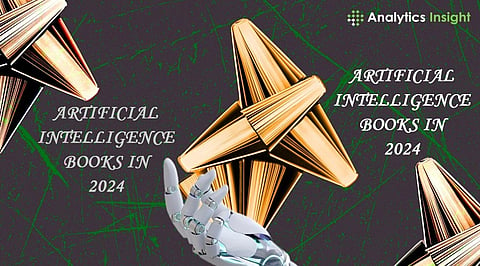

Artificial Intelligence (AI) is one of the most fascinating and impactful fields of technology, with applications and implications for various domains and industries, such as healthcare, education, business, and entertainment. As the field of AI evolves at a rapid pace, staying informed about the latest developments, trends, and ethical considerations is essential for professionals, researchers, and enthusiasts alike. In this article, we'll explore 10 must-read Artificial Intelligence Books in 2024 that offer valuable insights, perspectives, and knowledge for navigating the complex and dynamic landscape of AI.
Artificial Intelligence: A Guide for Thinking Humans provides a comprehensive understanding of artificial intelligence covering its history, fundamental concepts, applications, and current challenges. Through engaging narratives, the book explores the techniques and key concepts of artificial intelligence such as computer vision, neural networks, and machine learning.
The Algorithm provides the impact of artificial intelligence on the workplace: the way it is transforming the hiring process, evaluation, monitoring, and retaining of employees. Hilke Schellmann, an investigative journalist and journalism lecturer, takes you on a journey through the hidden and often unsettling truth of how HR departments are being used by artificial intelligence.
Progressive Capitalism is recommended for readers who want to understand the political and economic consequences of artificial intelligence and the way it is creating opportunities and challenges for society. The book also provides ways to respond to the challenges of Artificial Intelligence.
The Alignment Problem is essential if you want to comprehend the challenges of artificial intelligence. This book guides you to make machines behave in ways that are consistent with human values.Brian Christian,the author also presents the amazing people who are working on the alignment challenge, ranging from computer scientists to philosophers, and demonstrates how their insights and innovations might help us construct more useful and trustworthy AI.
AI 2041 is worth reading if you want to imagine the future of artificial intelligence: how it will impact various aspects of our lives, culture, and society over the next 20 years. Kai-Fu Lee, a notable venture capitalist and former president of Google China, and Chen Qiufan, an eminent science fiction writer, collaborate to create a unique and engaging blend of fiction and nonfiction. The stories are realistic and diverse, ranging from deep fakes in Nigeria to artificial intelligence teachers in Korea to self-driving cars in Sri Lanka.
Pedro Domingos explores the quest for the "master algorithm" – a universal learning machine capable of unlocking the secrets of intelligence. The author shows insights from computer science, psychology, and philosophy, and presents a compelling vision of AI's future and transformational possibilities in a variety of fields, including healthcare, finance, education, and entertainment.
In "Human Compatible," Stuart Russell discusses the existential concerns posed by advanced artificial intelligence, as well as the importance of aligning AI systems with human values and goals. Russell delves into the concept of provably beneficial AI and presents guidelines for creating AI systems that prioritize human well-being and safety, making it essential reading for politicians, engineers, and ethicists concerned with AI's societal ramifications.
Kai-Fu Lee offers a captivating exploration of the global race for AI dominance between China and Silicon Valley. Drawing on his extensive experience in the tech industry, Lee examines the economic, geopolitical, and ethical implications of AI development and offers insights into the strategies and challenges shaping the future of AI innovation and entrepreneurship.
"Deep Learning" provides a comprehensive introduction to the principles and techniques of deep learning, a subfield of AI that has revolutionized areas such as computer vision, natural language processing, and reinforcement learning. With contributions from leading experts in the field, this book offers theoretical foundations, practical insights, and hands-on examples for mastering deep learning algorithms and architectures.
Mark Coeckelbergh's book explores the ethical dimensions of artificial intelligence, addressing pressing questions surrounding privacy, accountability, bias, and autonomy. Through interdisciplinary perspectives from philosophy, sociology, and computer science, Coeckelbergh offers frameworks for ethical AI design and governance, empowering readers to navigate the complex ethical challenges posed by AI technologies.
These ten excellent AI books are not the only ones that you can read about artificial intelligence, but they are among the best ones available about AI in the market.
Join our WhatsApp Channel to get the latest news, exclusives and videos on WhatsApp
_____________
Disclaimer: Analytics Insight does not provide financial advice or guidance. Also note that the cryptocurrencies mentioned/listed on the website could potentially be scams, i.e. designed to induce you to invest financial resources that may be lost forever and not be recoverable once investments are made. You are responsible for conducting your own research (DYOR) before making any investments. Read more here.
